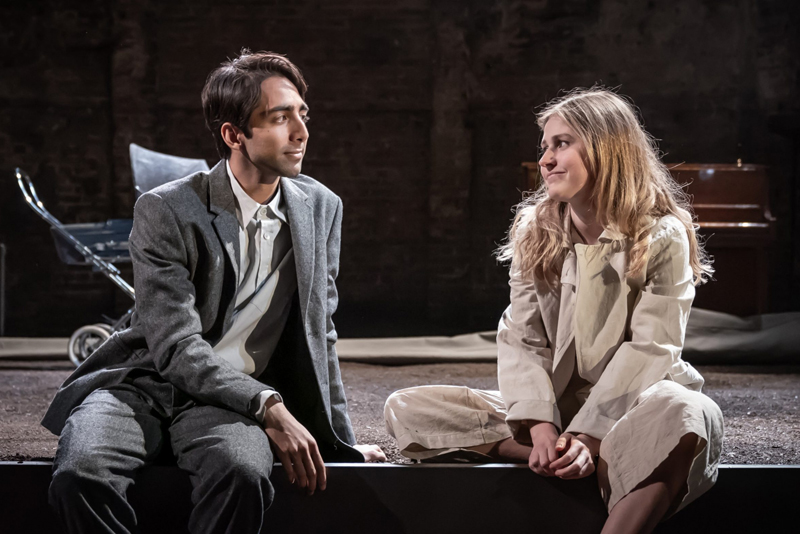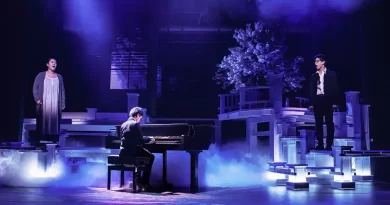“Three Sisters:” Almeida Theatre
Jeremy Malies in north London
17 April 2019
At most productions of Chekhov’s Three Sisters I end up longing for the train to Moscow just as much as the title characters. I’ve seen the play set in some bizarre locations; the Caribbean in 1941 with the girls pining for Cambridge where they had spent a liberated pre-war adolescence, a Hebridean island with Edinburgh as the mecca, and a Jewish quarter of Liverpool where the youngsters remember New York childhoods with an American mother and Russian emigré father.
But however unusual these settings, there has always been context and a pending revolution if only social. Cordelia Lynn’s recent adaptation directed by Rebecca Frecknall for the Almeida Theatre is rootless. We are in provincial Russia and the intended destination is indeed Moscow but that is about all we know of a liminal backdrop. There is a vague millennial tone to the sisters’ banter (despite the fact that they quote Gogol) but I would challenge anybody to pinpoint an approximate period. Frecknall even reinforces this vagueness to the point of using props from different eras. There is a difference between stripping something back to its essentials and leaving it in limbo.

Shubham Saraf as Tuzenbach and Ria Zmitrowicz as Irina.
Photo credit: Marc Brenner.
Is this a stumbling block? For the discussions of female emancipation and the social mobility surrounding Natasha’s rise to power and ultimate control of the property it certainly is. I should like to see these topics dealt with in some historical situation though of course not necessarily the era Chekhov envisaged.
This proviso apart, the project is bewitching. Patsy Ferran (an Olivier winner on her last outing here with Summer and Smoke, again directed by Frecknall) brings fine detail and instant credibility to the understated role of Olga, the courageous capable sister who endeavours to keep the household together. It is Pearl Chanda as Masha who proves the most compelling, initially with laconic aphorisms about the backwater the sisters inhabit and finally despair as her hopeless love affair with Vershinin (Peter McDonald) implodes and she realizes that he is as much a bird of passage as the giant cranes flying south over the estate for the winter.
By turns, Chanda projects her character’s wit, passion and self-destruct button. Never have I urged on a couple with such fervour in the theatre, with Chanda frequently in the signature Chekhov mode of speaking through tears before the maniacal sobbing when the battalion leaves town. McDonald copes with the philosophical disquisitions in his character that can easily become caricatured and vividly conjures up his psychotic offstage wife. The pair’s relish for each other’s ability with words is obvious and you can see how Brian Friel mainlined ideas from this play into his own work and became known as ‘the Irish Chekhov.’

Ria Zmitrowicz as Irina.
Photo credit: Marc Brenner.
Alan Williams could have found more light and shade as Chebutykin. He appears to have been neglected by Frecknall and squanders the set-piece drunken monologue as his character falls off the waggon after years of abstinence and admits to being incompetent as a doctor. Williams and Frecknall do nothing to hint (and there are clear suggestions in the text) that Chebutykin, who had been in love with the girls’ mother, may in fact be the father of Irina. By contrast, Elliot Levey is almost too charismatic in the role of cuckolded classics master Fyodor. Jokes that are supposed to misfire and show his social awkwardness produce laughs and he is a magnetic presence. Trying with little success to learn Latin myself at the moment, I would enrol him immediately as my tutor.
The sense of disconnection from any social fabric is reinforced by McDonald and Lois Chimimba (Natasha) using their resting accents which are Dublin and Glasgow respectively. Chimimba is particularly impressive when conveying her character’s viciousness in an argument with Ferran over the fate of an elderly servant. As Irina, the youngest sister, Ria Zmitrowicz proves skilful in suggesting that her character has travelled through a true arc of experience developing from entitled army brat to a realist.
Hildegard Bechtler’s minimalist set begins with serried rows of chairs at the father’s funeral before the focus becomes a raised dais surrounded by the Almeida’s bare brick. The design shows concealment and eavesdropping; Andrey (Freddie Meredith) squats in a recess feigning to read an orange-bound Penguin while observing his siblings. Things happen in corners and you are never quite sure where to look in the manner of a promenade performance. George Dennis’ sound design hints skilfully at the garrison town outside.
Rather like Irina’s hallmark spinning top, the production has just the right momentum levels. At crucial moments, notably the off-stage fire, the pace is dizzying before winding down to a trademark Chekhovian melancholy with reflections on spurned opportunities, energy devoted to lost causes and an undertow of regret.
In a perceptive programme essay, Lynn likens her relationship with the original text as a subtle dance. She has brought a colloquial tone to a literal translation by actor, historian and Russian scholar Helen Rappaport. The production succeeds through an ensemble who share Lynn’s linguistic rigour and intuition.









